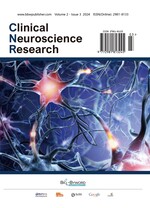Abstract
Objective: To analyze the effect of the blood glucose gap on post-stroke cognitive impairment in acute ischemic stroke patients. Methods: 300 stroke patients admitted to the hospital between December 2021 and December 2022 were selected and divided into three groups according to the value of blood glucose gap: the group with no elevation of blood glucose gap (n = 124), the group with mild elevation of blood glucose gap (n = 97), and the group with elevated blood glucose gap (n = 79). The same treatment regimen was applied to these three groups and cognitive function was assessed using MMSE and MoCA at 3, 6, and 12 months after discharge. Results: The NIHSS and MoCA scores of the patients in the group with elevated blood glucose gap were significantly higher than those in the mildly elevated group and the non-elevated group at 3, 6, and 12 months after discharge, and the MMSE and MoCA scores of the patients in the group with mildly elevated blood glucose gap were significantly higher than those in the non-elevated group at 3, 6, and 12 months after discharge, and there were statistically significant differences between all the groups (P < 0.05). Conclusion: Patients with an elevated glycemic gap in acute ischemic stroke showed more pronounced cognitive impairment than those with no elevated glycemic deficit, and the severity of cognitive impairment increased with the degree of glycemic deficit.
References
Cox ZL, 2020, Change in Admission Blood Glucose from Chronic Glycemic Status in Acute Heart Failure Hospitalization and 30-day Outcomes: A Retrospective Analysis. International Journal of Cardiology, 2020(299): 180–185.
Lee MW, 2021, Effects of Glycemic Gap on Post-Stroke Cognitive Impairment in Acute Ischemic Stroke Patients. Brain Sciences, 11(5): 612–621.
Zhou MG, Xue M, 2020, China Cause of Death Surveillance Dataset 2019. China Science and Technology Press, Beijing.
Ma QF, 2021, Temporal Trend and Attributable Risk Factors of Stroke Burden in China, 1990–2019: An Analysis for the Global Burden of Disease Study. Lancet Public Health, 2021(6): e897–e906.
Chinese Stroke Association, Expert Committee on Management of Cognitive Impairment after Stroke, 2017, Expert Consensus on the Management of Cognitive Impairment after Stroke. Chinese Stroke Journal, 12(6): 519–531.
Mijajlovic MD, 2017, Post-stroke Dementia—A Comprehensive Review. BMC Medicine, 15(1): 11–17.
Barbay M, Taillia H, Nedelec-ciceri C, et al., 2017, Vascular Cognitive Impairment: Advances and Trends. Revue Neurologique, 173(7–8): 473–480.
Lim JS, 2018, Effects of Glycemic Variability and Hyperglycemia in Acute Ischemic Stroke on Post-stroke Cognitive Impairments. Journal of Diabetes and its Complications, 2018(32): 682–687.
Koracevic G, Djordjevic M, 2021, Basic Types of the First Day Glycemia in Acute Myocardial Infarction: Prognostic, Diagnostic, Threshold and Target Glycemia. Primary Care Diabetes, 15(3): 614–618.
Lou R, Jiang L, Zhu B, 2021, Effect of Glycemic Gap upon Mortality in Critically Ill Patients with Diabetes. Journal of Diabetes Investigation, 12(12): 2212–2220.
Khalfallah M, 2020, Incidence, Predictors and Outcomes of Stress Hyperglycemia in Patients with ST Elevation Myocardial Infarction Undergoing Primary Percutaneous Coronary Intervention. Diabetes and Vascular Disease Research, 17(1): 1479164119883983.
Li Y, 2020, Impact of Glycemic Control Status on Patients with ST-segment Elevation Myocardial Infarction Undergoing Percutaneous Coronary Intervention. BMC Cardiovascular Disorders, 20(1): 36.
